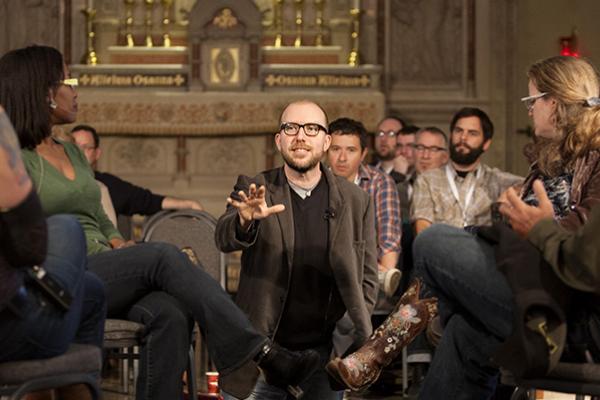Doug Pagitt and Tony Jones have been at this whole church leadership thing for a while now. As two of the voices at the forefront of the emerging Christianity movement, they are visionaries, strategists, and hands-on practitioners who, as much or more than anyone, have wrestled with the complex and persistent question of what tomorrow’s Christian faith looks like.
For one thing, there’s an emphasis on the word movement: ideas, communities, and understanding of what it means to be engaging a Christ-inspired faith in relevant ways is forever in flux. As such, certain contemporary iterations of the Christian tribe have been criticized for being ill defined or for too easily accommodating cultural trends.
But if Christianity is being true to the one from whom its name is borrowed, it will undoubtedly be countercultural. Any practice that has at it’s core mantras like “it’s not all about you,” or “community need trumps personal gain” will find a skeptical audience in popular culture. Jones and Pagitt are far less interested in offering church leaders a novel attraction gimmick to fill their struggling churches. Rather, they are focused on helping visionaries, activists, and theologians discern what it means to be a follower of Jesus in the 21st century.
That’s why they created the Christianity 21 Conference, part of what Pagitt describes as the Generous Christianity Movement.
“So often events have such a well-curated audience,” he says, “that the speakers all tend to come from the same perspective and approach. We desired to have an event with people on a broad spectrum share their sense of what will be important in the 21st century for faith and Christianity.”
The most recent event, which took place in Denver this January, is only the second of its kind, the first one having taken place in Minneapolis four years ago. And although it hasn’t been to this point, they hope to make it an annual event that moves around the country. The format is unusual as well, based in part on the Japanese PechaKucha speaking model. Though some speakers are offered the stage for exactly 21 minutes to speak on their given topics (no more, no less), others are beholden to a seven-minute timeframe, driven by 21 slides that automatically advance every 20 seconds.
“This was intended to give the maximum impact and allow for more than 60 people to share.” Thus the notion of generous Christianity: rather than allowing the floor to be dominated by a handful of prominent — and often mind-numbingly similar — voices, the intent of such a format is both to keep things moving and to make room for as many diverse subjects and perspectives as possible.
As one of the seven-minute speakers, I offered a spoken word poetry piece on the intersection of faith and the arts. But in that same hour, I shared the microphone with a tattooed evengelical chiropractor who extolled his version of the Old Testament diet, a woman who offered practical wisdom on consumer-centered social justice, and even one educator who made up his presentation on the spot.
And yes, he finished closer to on time than I did, and I had a script.
I asked him about the inclusion of what I considered more “evangelical” voices at a conference organized by two well-known Christian progressives.
“Selecting speakers for events is always a ‘in the moment’ decision,” Pagitt says. “There was no agenda behind the selection of evangelicals other than we thought it would make a good mix at this time in history.
“Frankly, what it means to be an evangelical is under such transition and so many pressures I'm not even sure if that title is meaningful. I think there are a number of the speakers at Christianity 21 who would say something like, ‘I speak to many evangelical audiences, but I don't self-define with that term.’ And there are others for whom it still has meaning. But to us as the organizers, we are interested in the person more than the label.”
So what’s the point? Why have yet another conference where people travel from all over the country to talk about ideas that could be shared on a blog, in a book, or even by web conference?
“Relational connection is key,” says Pagitt. “We hope that relationality is supported with a great experience and learning, but fundamentally the world is in need of more leaders with better relationships and a healthy optimism.
“If we can play a small role in that,” he says, “we would be thrilled.”
The 2015 Christianity 21 conference has not yet been announced. Date and location will be available in the next couple of weeks at http://c21.thejopagroup.com.
Christian Piatt is a Sojourners Featured Writer and an author, editor, speaker, musician, and spoken word artist. He is director of church growth and development at First Christian Church in Portland, Ore. Christian is the creator and editor of Banned Questions About The Bibleand Banned Questions About Jesus. His new memoir on faith, family and parenting is calledPREGMANCY: A Dad, a Little Dude and a Due Date.
Got something to say about what you're reading? We value your feedback!
